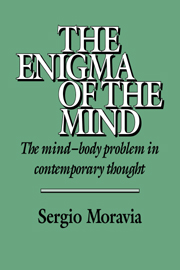Book contents
- Frontmatter
- Contents
- Preface to the English edition
- The enigma of the mind
- The enigma of the mind: Introduction to a metaphor
- 1 Toward a physical science of the mental: Feigl and the (re-)construction of the ‘mind–body problem’
- 2 The apogee of physicalism: The identity theory and materialism in the Australian school
- 3 The obscure relationship: Problems and debates surrounding the identity theory
- 4 Psychology as alchemy: The elimination of the mental in the ‘disappearance theory’
- 5 The mind as function: The functionalist approach to the mind–body problem
- 6 The mind as property and as event: The ‘reformist’ neo-identityism of Kim and Davidson
- 7 The mind as language: The linguistic turn in the mind–body problem
- 8 Speaking in many different ways: The pluralization of descriptions and explanations in the MBP
- 9 The mind as a mode of subjective experience: An interpretive model of the features of the mental
- 10 The mind as ‘subject’ and as ‘being-in-the-world’: Toward a non-mentalistic interpretation of the mental
- Appendix The mental as intentional/‘personal’ emergence: The psycho-personological perspective of Joseph Margolis
- Bibliography
- Name index
3 - The obscure relationship: Problems and debates surrounding the identity theory
Published online by Cambridge University Press: 05 June 2012
- Frontmatter
- Contents
- Preface to the English edition
- The enigma of the mind
- The enigma of the mind: Introduction to a metaphor
- 1 Toward a physical science of the mental: Feigl and the (re-)construction of the ‘mind–body problem’
- 2 The apogee of physicalism: The identity theory and materialism in the Australian school
- 3 The obscure relationship: Problems and debates surrounding the identity theory
- 4 Psychology as alchemy: The elimination of the mental in the ‘disappearance theory’
- 5 The mind as function: The functionalist approach to the mind–body problem
- 6 The mind as property and as event: The ‘reformist’ neo-identityism of Kim and Davidson
- 7 The mind as language: The linguistic turn in the mind–body problem
- 8 Speaking in many different ways: The pluralization of descriptions and explanations in the MBP
- 9 The mind as a mode of subjective experience: An interpretive model of the features of the mental
- 10 The mind as ‘subject’ and as ‘being-in-the-world’: Toward a non-mentalistic interpretation of the mental
- Appendix The mental as intentional/‘personal’ emergence: The psycho-personological perspective of Joseph Margolis
- Bibliography
- Name index
Summary
THE CONCEPT OF IDENTITY: MODES AND USES
A considerable variety of positions has already emerged from the debate on the identity theory. Some of these address the more general aspects and implications of the theory, while others touch on specific issues. It is not necessary for our purposes to examine everything that has been written on the subject, but it will be useful to see, through certain selected texts and problems, how identity theorists have brought some of their difficulties into focus.
The issue which has perhaps caused the most animated discussion is the concept of identity itself. Curiously enough, the majority of identity theorists do not seem to be very concerned with this question. Feigl, it is true, does discuss the notion, but in his later works he seems to be so little convinced of its consistency and utility that he puts it more or less explicitly on a back burner. Place contributes a few important distinctions to the problem, but as his investigation progresses he tends to bracket off the issue as secondary. This tendency is even more evident in Smart; and with Armstrong, who deals with the concept of identity in a few meager pages in A Materialist Theory of Mind, it becomes disconcertingly conspicuous (see Kneale 1969, p. 295). Many other proponents of the identity theory as well generally ignore the problem or make only passing reference to it.
Information
- Type
- Chapter
- Information
- The Enigma of the MindThe Mind-Body Problem in Contemporary Thought, pp. 105 - 117Publisher: Cambridge University PressPrint publication year: 1995
